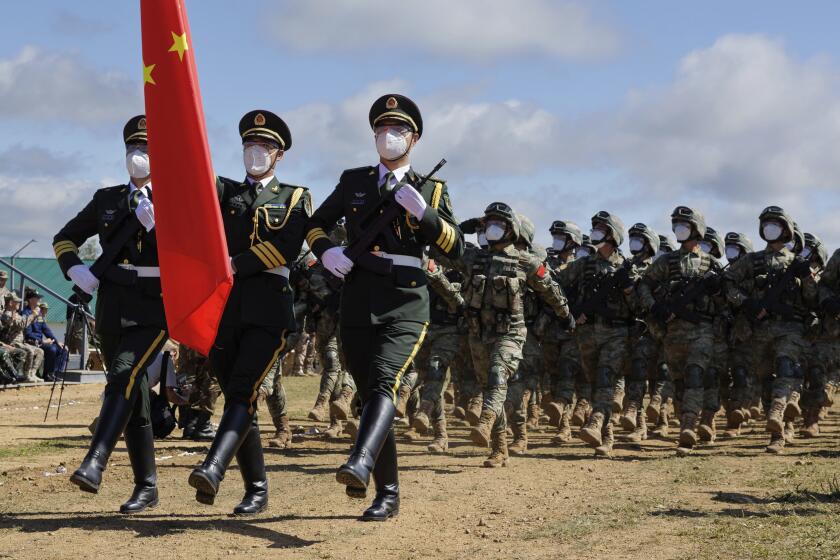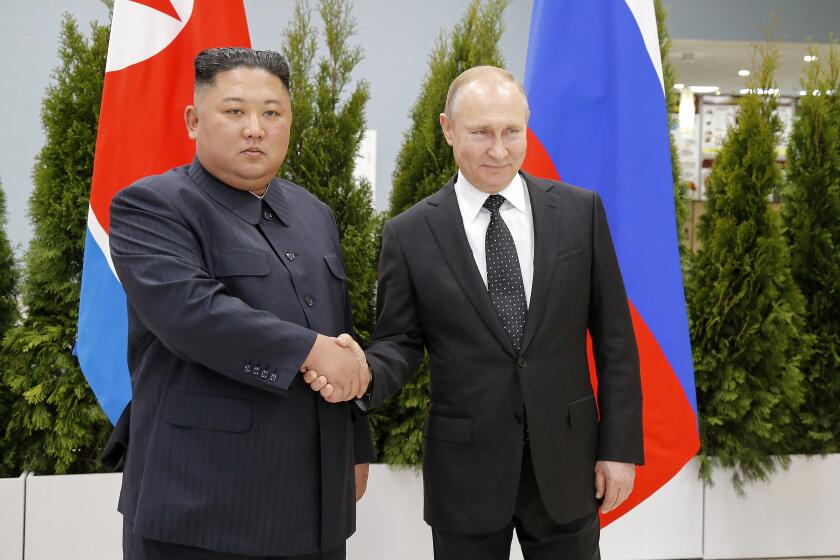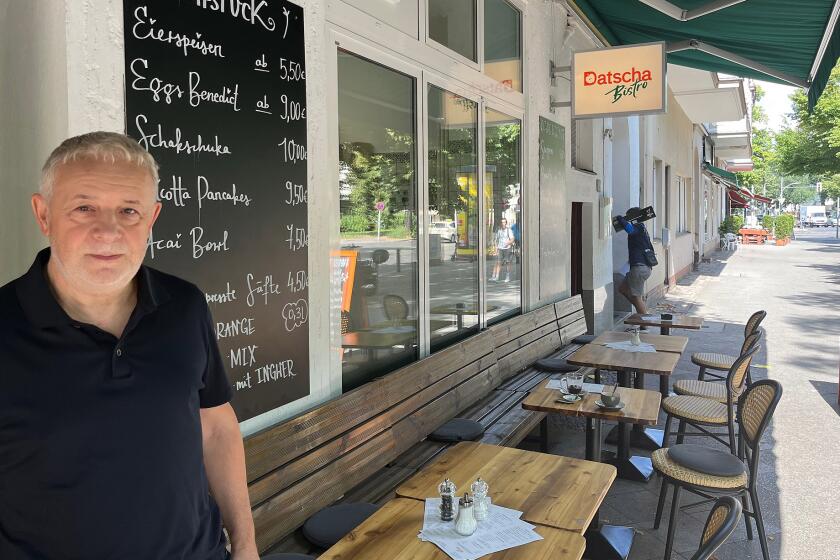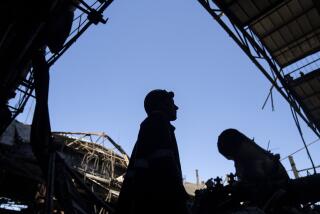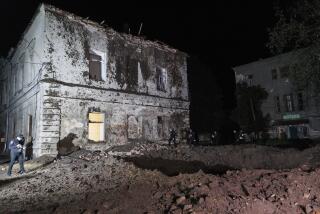U.N. inspectors to have ‘full picture’ of Ukraine nuclear plant in days
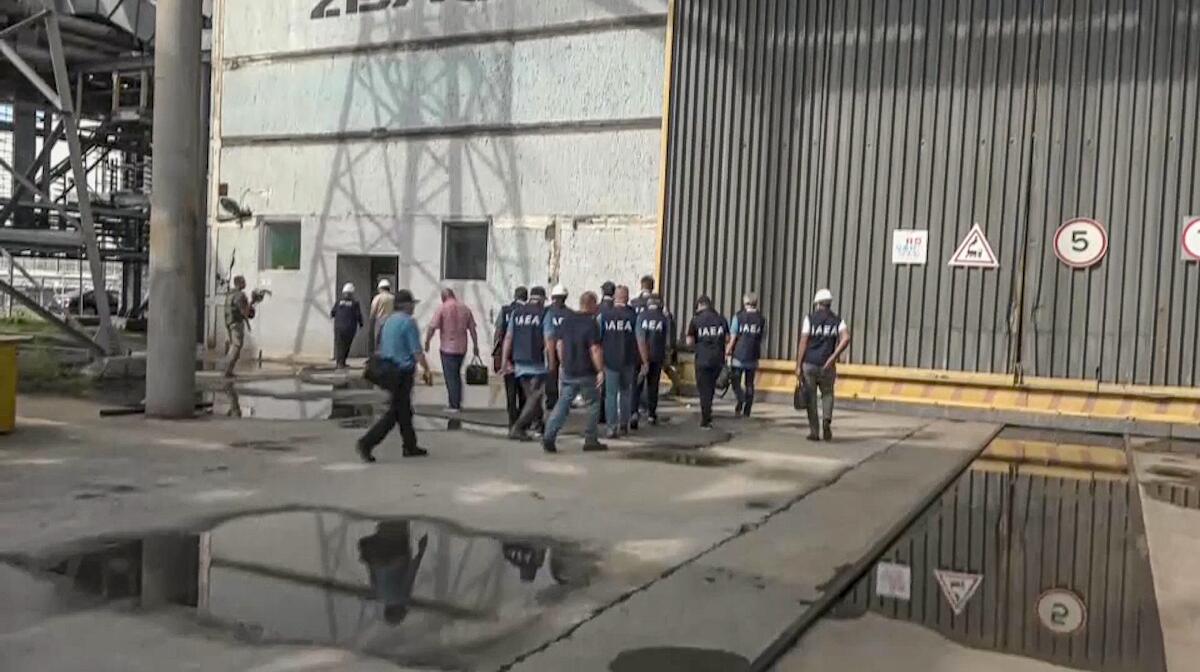
- Share via
ZAPORIZHZHIA, Ukraine — Fighting raged Friday near Europe’s biggest nuclear power plant in a Russian-held area of eastern Ukraine, as inspectors from the U.N.’s nuclear watchdog agency expressed concern over the facility’s “physical integrity” but didn’t blame either warring side.
International Atomic Energy Agency Director-General Rafael Grossi said he expects to produce a report “early next week, as soon as we have the full picture of the situation by the end of the weekend, more or less.”
Speaking to reporters in Vienna after returning from the Zaporizhzhia nuclear power plant, he said he would brief the U.N. Security Council on Tuesday.
“We’ve seen what I requested to see — everything I requested to see,” Grossi said, adding that his big concerns were the plant’s “physical integrity,” the power supply to the facility and the situation of the staff.
“The military activity and operations are increasing in that part of the country, and this worries me a lot,” he said. “It is obvious that the statistical possibility of more physical damage is present.”
He noted that shelling started in August and “it is quite clearly a more recent trend,” but didn’t apportion blame for damage that has been done so far.
The joint drills showcase the increasing military ties between Moscow and Beijing, which have strengthened since Russia invaded Ukraine.
The head of Ukraine’s nuclear watchdog, Oleh Korikov, said Ukrainian officials “would like more decisive actions and statements” from the U.N. inspectors. “But let’s wait until the mission is over,” he added.
Local Russian-appointed authorities said Friday that staff at the plant restarted a key reactor just hours after shelling a day earlier forced it to shut down. Ukraine’s nuclear energy operator, Energoatom, confirmed on its Telegram channel that the reactivated reactor had been plugged back into the power grid.
Aleksandr Volga, the Kremlin-backed mayor of Enerhodar, where the Zaporizhizhia plant is located, told the Interfax news agency that the facility now had two working reactors, out of a total of six.
The head of Ukraine’s powerful National Security Council, Oleksiy Danilov, said Ukrainian authorities weren’t fully aware of the situation inside the plant for now — despite the presence of the U.N. team that went in Thursday.
In an interview with the Associated Press, Danilov — a key official in Ukraine’s war effort — said, “I want to emphasize that this is a challenge for the whole world, how to make this nuclear facility not dangerous.”
Russia and Ukraine traded blame for the shelling, which led to Thursday’s temporary shutdown of the reactor by its emergency protection system. Energoatom said the attack damaged a backup power supply line used for in-house needs, and one of the plant’s reactors that wasn’t operating was switched to diesel generators.
Britain’s Defense Ministry said Friday that shelling continued in the area near the plant, and Ukrainian President Volodymyr Zelensky’s office said Russian shelling damaged houses, gas pipelines and other infrastructure on the other bank of the Dnieper River — part of fighting in several areas of eastern and southern Ukraine overnight.
Russian-backed officials in Enerhodar claimed Russian forces had shot down an armed Ukrainian drone near the plant Friday.
“Ukrainian militants, apparently, continue to try to attack the plant despite the fact that there are IAEA employees there,” the press service of the municipal administration said in a statement.
In its regular update on Friday evening, the Ukrainian military said it had carried out a “precision strike” in Enerhodar, but did not acknowledge or directly respond to the claims by Kremlin-backed officials. It said the attack destroyed three artillery systems, an ammunition depot and a company of personnel.
Russia and Ukraine traded accusations that the other side was trying to impede the work of the IAEA experts and to control the message.
In a conference call with reporters on Friday, Kremlin spokesman Dmitry Peskov said Moscow considered “positively” the arrival of the mission, “despite all problems and difficulties caused by the Ukrainian side’s provocative actions.”
The 14-member delegation arrived in a convoy of SUVs and vans after months of negotiations to enable the experts to pass through the front lines. They braved gunfire and artillery blasts along the route.
Grossi said Friday that six of the agency’s experts remain at the plant, and there will be a “permanent presence on-site … with two of our experts who will be continuing the work.” He wasn’t specific about how long exactly the two experts will stay.
“The difference between being there and not being there is like day and night,” he said.
The plant has been occupied by Russian forces but run by Ukrainian engineers since the early days of the 6-month-old war.
North Korea is hinting at its interest in sending construction workers to help rebuild Russian-occupied territories in eastern Ukraine.
Grossi said there was a “professional modus vivendi” at the site. He said it was “admirable for the Ukrainian experts to continue to work in these conditions.”
“It’s not an easy situation. It’s a tense situation, it’s not an ideal situation — it’s a situation everybody is coping with,” he said.
Ukraine alleges that Russia is using the plant as a shield to launch attacks. On Friday, Russian Defense Minister Sergei Shoigu rejected the Ukrainian allegations and said Russia has no heavy weapons either on the site or in nearby areas.
Shoigu said Ukrainian forces have fired 120 artillery shells and used 16 suicide drones to hit the plant, “raising a real threat of a nuclear catastrophe in Europe.”
Germany is home to one of the world’s biggest Russian diaspora communities, but the Ukraine war has sparked incidents of ostracism and discrimination.
Elsewhere in Ukraine on Friday, Zelensky’s office said four people were killed and 10 others injured over the last day in the eastern Donetsk region, a key hub of the Russian invasion.
More to Read
Sign up for Essential California
The most important California stories and recommendations in your inbox every morning.
You may occasionally receive promotional content from the Los Angeles Times.
